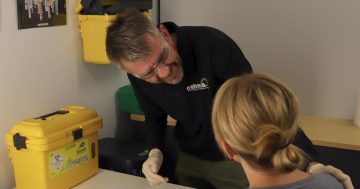
The ACT will implement a new prescription monitoring system later this year. Photo: File.
The ACT will be one of the first jurisdictions to roll out a national prescription monitoring system to reduce the growing harms associated with pharmaceutical abuse while preventing patients from ‘doctor shopping’ for prescription drugs.
Called Canberra Script, the new system provides real-time alerts and notifications back to medical practitioners of patients who may be exhibiting signs of drug-seeking behaviour.
The system is also seen as a deterrent to Australia’s growing problem associated with the misuse and abuse of pharmaceuticals such as benzodiazepines and highly addictive opioid-based pain medications such as Oxycodone.
Canberra Script is the ACT’s version of a national real-time prescription monitoring system (RTPM). It will replace the existing DAPIS Online Remote Access (DORA), introduced by ACT Health in March 2019.
Before that, all ACT pharmacies were required to manually submit information about scripts to ACT Health each week via a web portal.
Canberra Script will be trialled with several providers later this year before being rolled out to all providers in early 2022.
Health Minister Rachel Stephen-Smith said the ACT Government allocated $2.1 million from the 2019-20 ACT Budget to introduce Canberra Script, which will be voluntary for general practitioners and pharmacists until the government evaluates its uptake.
“We’ve been the first jurisdiction to fund participation in real-time prescription monitoring at a national level,” Ms Stephen-Smith said.
“But to make sure we have comfort with that system among providers before we consider making it mandatory, we want to see strong take-up from providers.”
The Health Minister said more conversations needed to be held about the take-up of the new system after the previous system, DORA, was not mandatory due to reluctance from GPs and pharmacies.
“We’ve still got a bit of a way to go in that conversation about the take-up of this new system in response to drugs that it monitors, but also some with additional schedule 4 drugs to be added to the new monitoring program,” Ms Stephen-Smith said.
She said Australia has a growing problem with the misuse and abuse of pharmaceuticals. National health authorities estimate the number of people harmed, including deaths from prescription medicines, is now higher than for illegal drugs.
Ms Stephen-Smith said Canberra Script does not intend to disadvantage consumers where there is a legitimate clinical need for a medicine.
“Canberra Script will give ACT doctors, nurse practitioners and pharmacists a better view of what their consumers are using. This supports practitioners to provide safe care for ACT residents,” she said.
“It gives practitioners access to a new RTPM system that has improved functionality and features. Usability has been key in developing this new system, delivering an easier to understand and use interface.
“Working directly with practitioners and representative groups and seeking their feedback on the system now, we aim to deliver a system across the ACT that all health practitioners who prescribe or dispense monitored medicines will want to use.”
Further information about Canberra Script, including the release date and training packages, will be provided later this year.





















